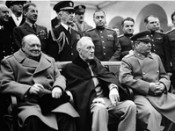
The end of Yalta conference of the heads of governments of the USSR, USA and Great Britain
By the beginning of 1945 as a result of the Soviet Army offensive and the invasion of Normandy by the Allied forces, the military actions were transferred to the German territory and the war against the Nazi entered its final stage. Due to these events the Allies of Russia in the World War II decided to summon a conference to discuss the issues of the postwar reorganization of Europe.
The meeting of the heads of governments of the USSR, USA and Great Britain was held from February 4 to February 11, 1945 in the Livadia Palace, near Yalta. Besides the President of the People’s Commissars of the USSR Council V.I. Stalin, the USA president F. Roosevelt and the Great Britain Prime minister W. Cherchill in conference took part the Ministers of Foreign Affairs of the three powers: V. Molotov, E. Stattinius and A. Iden along with the General Staff’s representatives.
As a result of the discussion regarding further plans for military actions were made the important decisions about the offensive coordination of the Allied forces in the center of Germany. The Allies approved the agreements developed by the European consultation committee ‘On the occupation zones of Germany and “The Big Berlin” administration’ as well as ‘On the mechanism of control in Germany’. It was provided that the whole Germany would be divided into occupation zones.
After the discussion of the issue regarding the reparation of damages by Germany to the USSR and other Allied states, it was decided to create in Moscow a special inter-associate committee on reparations.
‘The declaration of the liberated Europe’ adopted in the course of the conference, stipulated the interaction of the USA, USSR and Great Britain at resolving political and economic problems of the liberated Europe in accordance with democratic principles.
During the meeting in Yalta it was also decided to convene in April of 1945 in Saint-Francisco a conference of the United Nations with the view to elaborate regulations for a new international organization intended to maintain peace.
One of the most important issues during the conference was one regarding Poland. It was decided to create a Polish government on the basis of the current Provisional government including democratic figures from the Poland itself and Poles from abroad. The issue on borders was not completed but it was supposed that the Polish-Soviet border will be passing along “Kerzon line” established back in 1920 with some deviations of 5 to 8 km in favor of Poland.
The leaders of the USSR, USA and England had elaborated the recommendations regarding the creation of the united Yugoslavian government from the representatives of the National committee of Yugoslavia liberation and emigrant Yugoslavian government based in London, as well as the creation of a Provisional government of Yugoslavia on the basis of the anti-Nazi popular assembly of the national liberation.
In Yalta it was agreed that the Soviet Union, two-three months after the end of military actions in Europe will start a war with Japan demanding the restoration of the Russian rights at the Far East – return of the Southern Sakhalin and passing over Kuril islands.
On February 13, 1945 it was published a communiqué on the Crimea conference signed by the heads of the three governments. In the last section the great powers expressed their resolution to maintain and strengthen the principle of the united action in the post-war period which had been elaborated during the years of the World War II.
The contradictions between the USSR and its allies, which sharpened after the war along with the change of political leaders at the end of the forties, decreased significantly the possibilities of cooperation. However the decisions made in the course of Yalta conference became a fundament for the post-war world layout and had a great impact on the future history of the 20th century.
Lit.: Крымская конференция 1945 г. // Большая советская энциклопедия. Т. 13. М., 1973; Крымская (Ялтинская) конференция [Электронный ресурс] // Хронос. 2000. URL: http://www.hrono.ru/sobyt/1900sob/1945krym.php; Материалы Крымской (Ялтинской) конференции руководителей трёх союзных держав — СССР, США и Великобритании [Электронный ресурс] // Электронная библиотека исторического факультета МГУ. 1999-2018. URL: http://www.hist.msu.ru/ER/Etext/War_Conf/krim.htm; Советский Союз на международных конференциях периода Великой Отечественной войны 1941–1945 гг. М., 1984; То же [Электронный ресурс]. URL: http://militera.lib.ru/docs/da/confww2/index.html; Ялта-45. Начертания нового мира / Под ред. Н. Нарочницкой. М., 2010; Ялтинская конференция (4-11 февраля 1945 г.) [Электронный ресурс] // Победа, 1941-1945. 2004-2018. URL: http://victory.rusarchives.ru/index.php?p=32&sec_id=51.
Based on the Presidential Library’s materials:
Крымская (Ялтинская) конференция [фотография]. The Crimea Conference [graphic]. 1945;
The first diplomatic and trade treaty between Japan and Russia signed // On this day. 7 February;

